Maverick Citizen
Young women boxers in Joburg’s inner city fight for Nirvana
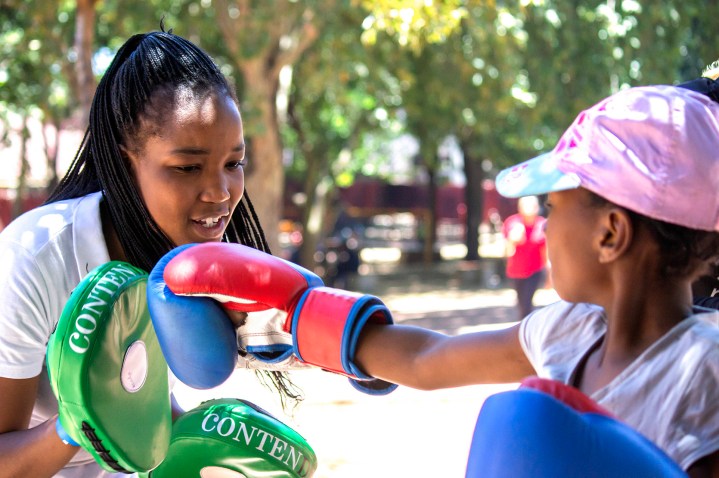
‘Nirvana is a sacred space that we have reimagined for every inner-city girl or young woman so that she may achieve anything she sets her mind to. Here, we support and inspire each other. We develop skills. We align to the values of leadership, focus, purpose and passion. We encourage freedom of expression through the arts. We nurture a sense of compassion for humanity by being of service to our young and old. Here is where we grow.’
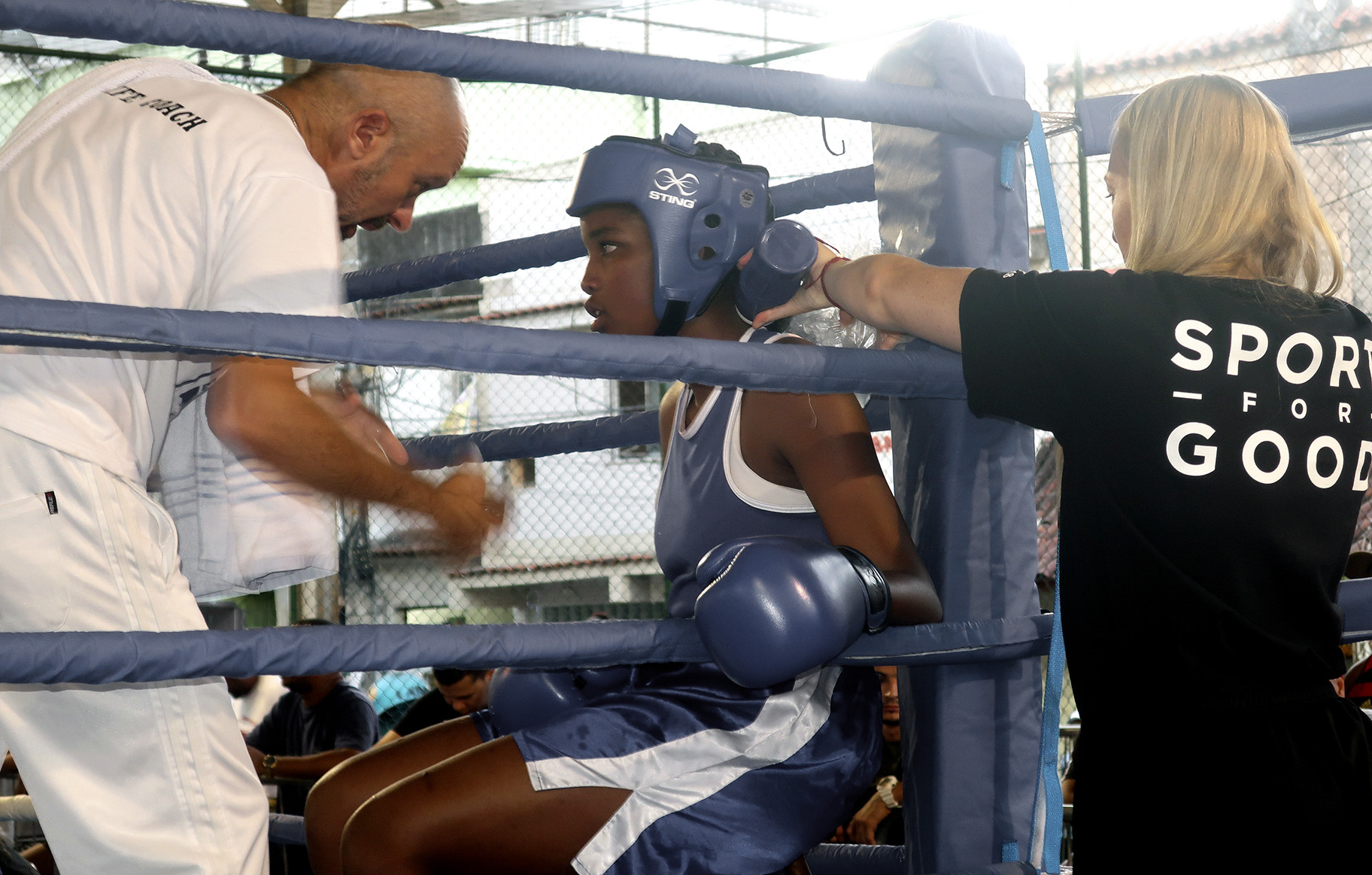
Jennifer Matibi in the ring. (Photo: Keuen Roberts)
In downtown Johannesburg, on Beyers Naude square opposite the old city library, there is a powerful statue of a black woman. She stands erect, carries a child on her back, a candle (or is it a Molotov cocktail?) in one hand and a placard that says Democracy in Dialogue in the other. The statue is on stilts, helping her to stand tall against the sky.
I came across the statue during a fundraising fun-cum-history run organised by the Johannesburg Inner City CAN collective to celebrate Women’s Day on 9 August. The route passed a series of monuments in the inner city that pay tribute to the role of women in the struggle for freedom, including paintings of women leaders on the walls of the Old Fort, the Women’s Jail, the Firewalker, a public sculpture by William Kentridge, and the “enduring love” statue of Walter and Albertina Sisulu.
But much as the past moved me, it was women of the present who were most on my mind. I was being led by 19-year old Jennifer Matibi, a founder member of Nirvana, a collective of young women who are boxers at the Fight With Insight gym.
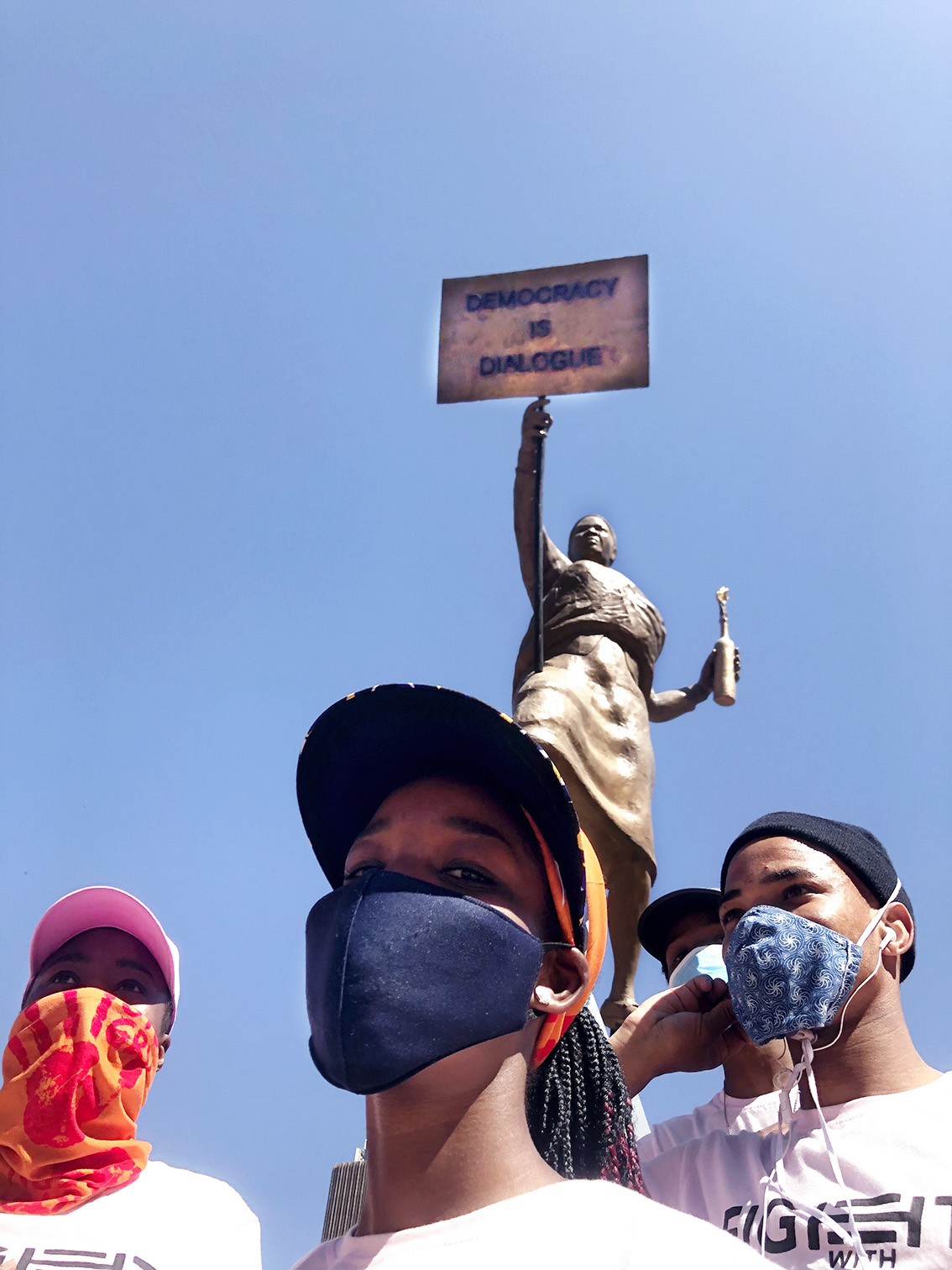
The Democracy in Dialogue statue. Jennifer Matibi and members of Nirvana.
(Photo: Mark Heywood)
As we panted from statue to statue, Jennnifer told me more about Fight with Insight (FWI) and Nirvana, throwing in snippets of her life and her dreams. The story was a fascinating one about imagination, innovation, courage and persistence.
But it was hard to concentrate as I struggled to keep up with someone 30-plus years younger than me. So last week I sat down with Sheri Errington, one of the directors of Fight with Insight, as well as Nirvana activists Jennifer, Sidumiso Mabaso, 19, Ayanda Mulaudzi, 16, and Langelihle ‘Langa’ Malinga, 19, to learn more.
The story is best told in their own words.
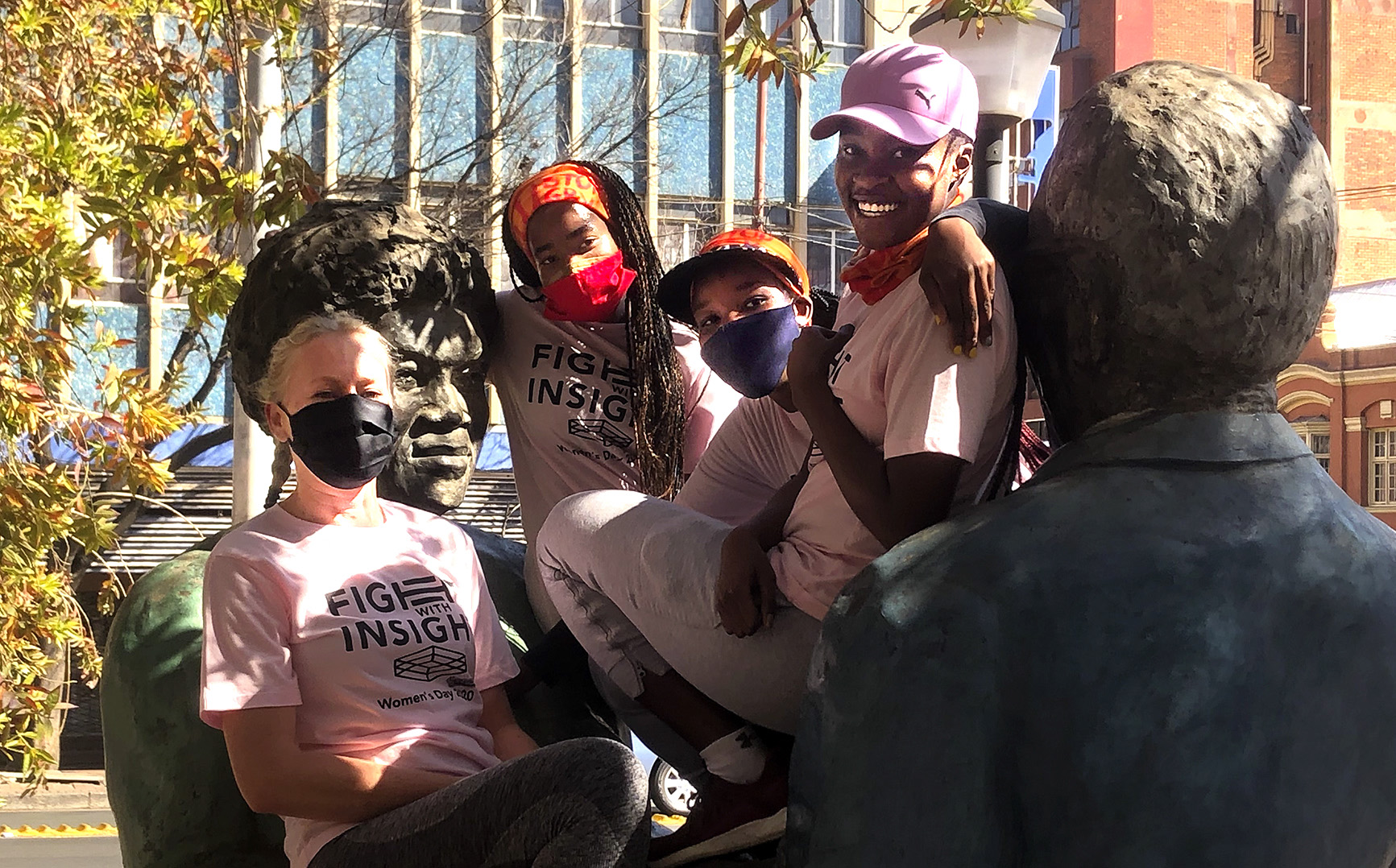
Sheri Errington with members of Fight With Insight.
(Photo: Mark Heywood)
Fight with Insight: the beginnings
Sheri Errington is a research psychologist and one of the directors of FWI. According to Sheri, FWI came about in part by accident. At the time, she worked at the Teddy Bear Clinic with Luke Lamprecht. Apart from being a highly respected neuro-developmentalist, Lamprecht is also a keen runner, boxer and advocate for sports and social justice.
In 2006, a chance meeting with former pro boxer Anton Gilmore led to the two deciding to set up Fight With Insight. They dreamed of establishing a boxing initiative for young people who were part of a diversion programme to assist children in conflict with the law for sexually offending behaviour (sometimes called “social contact crimes”) run by the Teddy Bear Clinic.
In the following years, observational research by Errington (which was published in the Journal of Psychology in Sport and Exercise and evaluated by the Teddy Bear Clinic) confirmed the benefits boxing offered in breaking down cognitive barriers and complementing therapeutic programmes. In neuro-psychologist talk, she explains to me that trauma – which often gives rise to sexual offences – is stored in the basal, not the cognitive, part of the brain.
“Physical exercise, particularly boxing, can help surface and manage that trauma.”

From left to right: Jennifer Matibi, Langelihle (“Langa”) Malinga , Ayanda Mulaudzi , Sidumiso Mabaso. (Photo: Mark Heywood)
In addition, introducing boxing as a part of the diversion programme meant the children were attending therapy for a reason other than just the offence: it provided “a focus on the positive and not just the negative”.
In those days, jokes Sheri, “Luke and I worked to support our FWI habit.”
However, such was the success of the programme, and so great the need for an ongoing and accessible recreational facility for all inner-city youth, that in 2015, after Luke returned from visiting Fight for Peace – a similar programme based in the favelas of Rio De Janeiro – a decision was taken to set up FWI as a fully fledged gym. The expanded aim was to create a safe space for youth, using boxing to teach them life skills and to assist them in taking responsibility for claiming their rights.
Errington remembers that on the day they opened, three children attended – by the end of the year there were 50 to 60, and today they have over 150 regulars, with up to 700 young people passing through the gym every year.
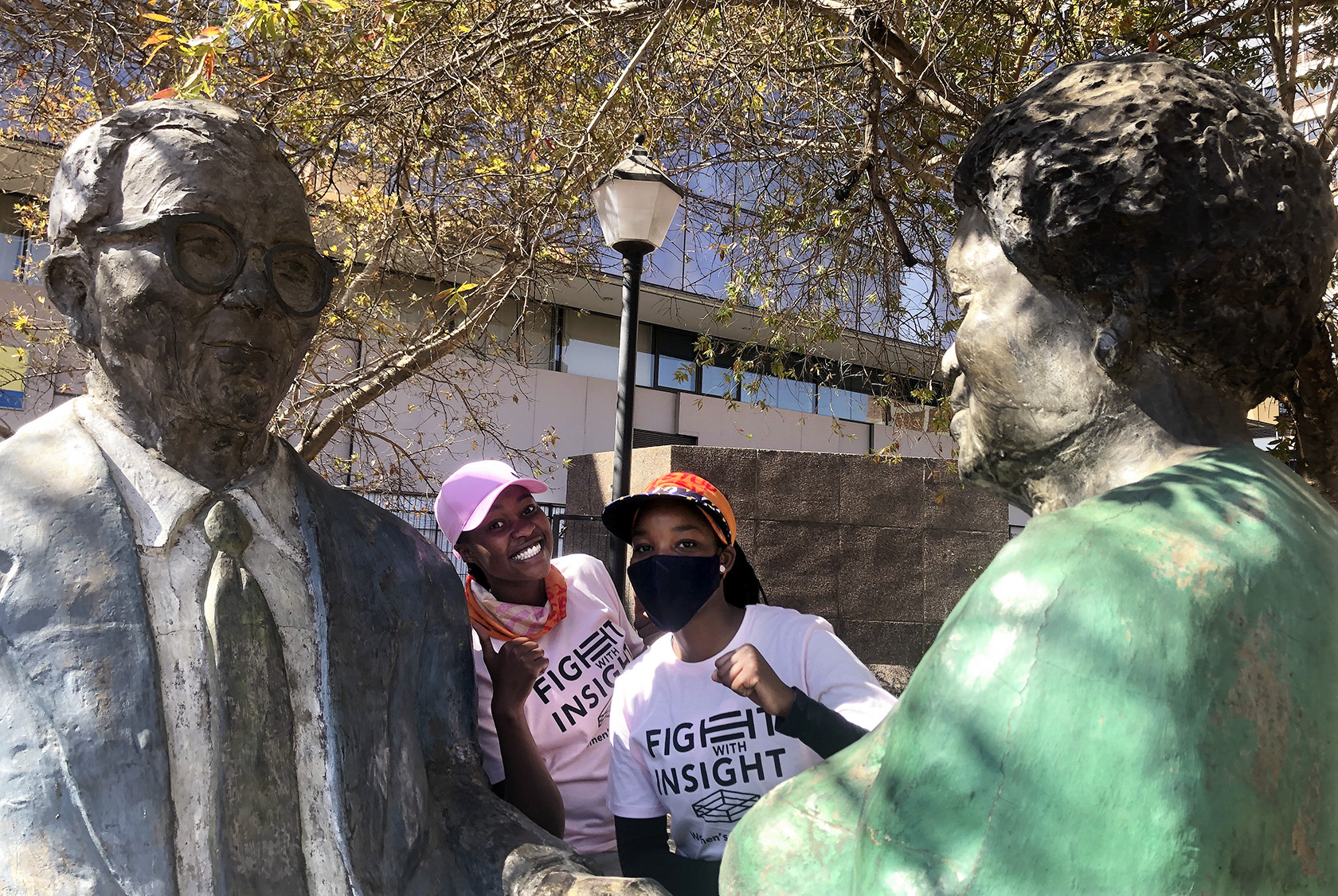
Jennifer Matibi, Sidumiso Mabaso with the Albertina and Walter Sisulu. (Photo: Mark Heywood)
Initially the gym was purely recreational, but since then the programme has taken on a life of its own, developing a library and a cooking and nutrition programme. Today its management also embraces a youth council – young boxers who self-select to be part of planning and strategy. This way, it has become a training ground not just for boxing, but for life and leadership skills as well.
In words Errington attributes to Lamprecht, it has provided “psychological foot-soldiers”, young men and women who go into communities they come from and provide “psychological first aid” to the bruised and battered souls of young people growing up in difficult conditions.
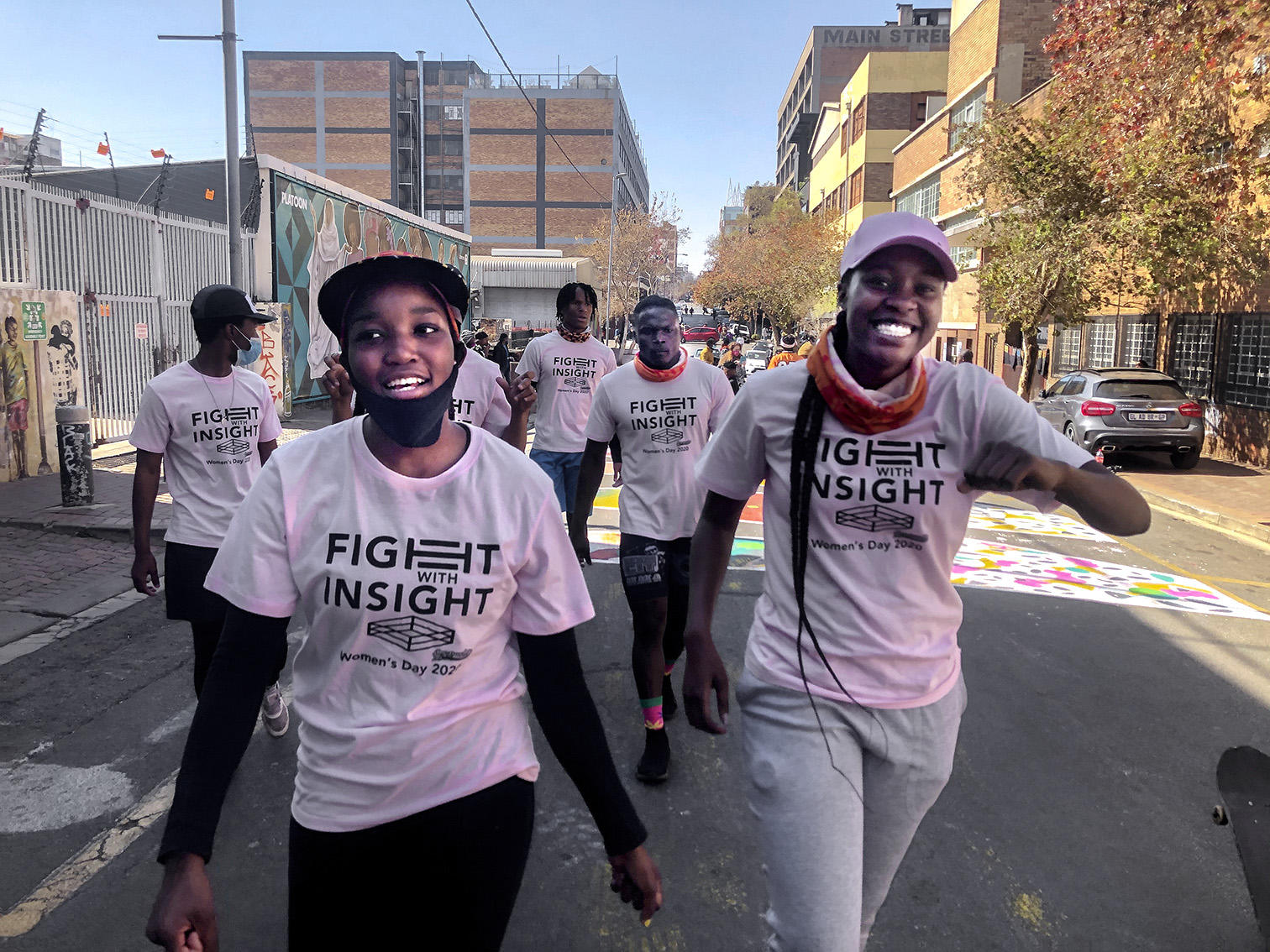
Jennifer Matibi, Sidumiso Mabaso and boxers from Fight with Insight run in the city on Women’s day.
(Photo: Mark Heywood)
Enter the dragons
It was around 2015 that Jen Matibi, who has lived in the same Hillbrow flat all her life, took her first tentative steps into boxing.
“I first heard about Fight with Insight from a friend. In the inner city there are kids like me and there are kids free to go anywhere. My mum works in a dry cleaners in Rosebank and she is very protective about me.”
From talking to all the girls, it’s clear that fear rules in the minds of their parents. Hillbrow is a dangerous place to bring up a young girl, with concurrent epidemics of teenage pregnancy, prostitution and drug use. The response of many mothers is literally to lock their children inside their home. The expectation of many parents is that “you stay at home, go to school, go to varsity, get a job and get out of Hillbrow”, says Jen.
Langa talks about how, when she was about 12, “I stopped playing outside… many of the girls in the building used to get pregnant around that age.” Instead, she concentrated on her books and on school debating. It was Jen who introduced her to boxing where, initially, she says she was intimidated because “we just saw boys”.
Jen admits that to begin with she lied to her mother about going to the gym. Initially, even she was sceptical about its benefits. “At first it had no meaning, but then it began to become a place of purpose. It made me not to be closed inside. I was a troubled child,” she says, sounding older than her 19 years.
“I had clinical depression. Boxing became a way to have purpose and family. The gym impacted on who I am.” The others nod in agreement.
Ayanda lived in Yeoville. She heard about the gym when her grandfather died and she moved to Hillbrow, and ended up living in the same building as Jen. With a smile on her face, she recollects how “the first time I punched the bag I felt ‘I’m home’. Boxing made me stand out and show I’m different from the whole world… in a good way. It’s where I take out my anger.”
Sidumiso went through a similar experience.
Her childhood had been extremely difficult, forcing her to become an adult when she was still a child. Her mother, the family’s primary provider, was hospitalised for a year with TB, and when her father absconded the family was evicted and eventually she was sent to boarding school in Limpopo. Yet, she said, “immediately when I punched that bag, I felt ‘I love this’. It made me feel secure about myself”.
In boxing, Langa found an acknowledgement that her mother, for all her fears, had not been able to give her. “It gave me the confidence to go and help out at my building.”
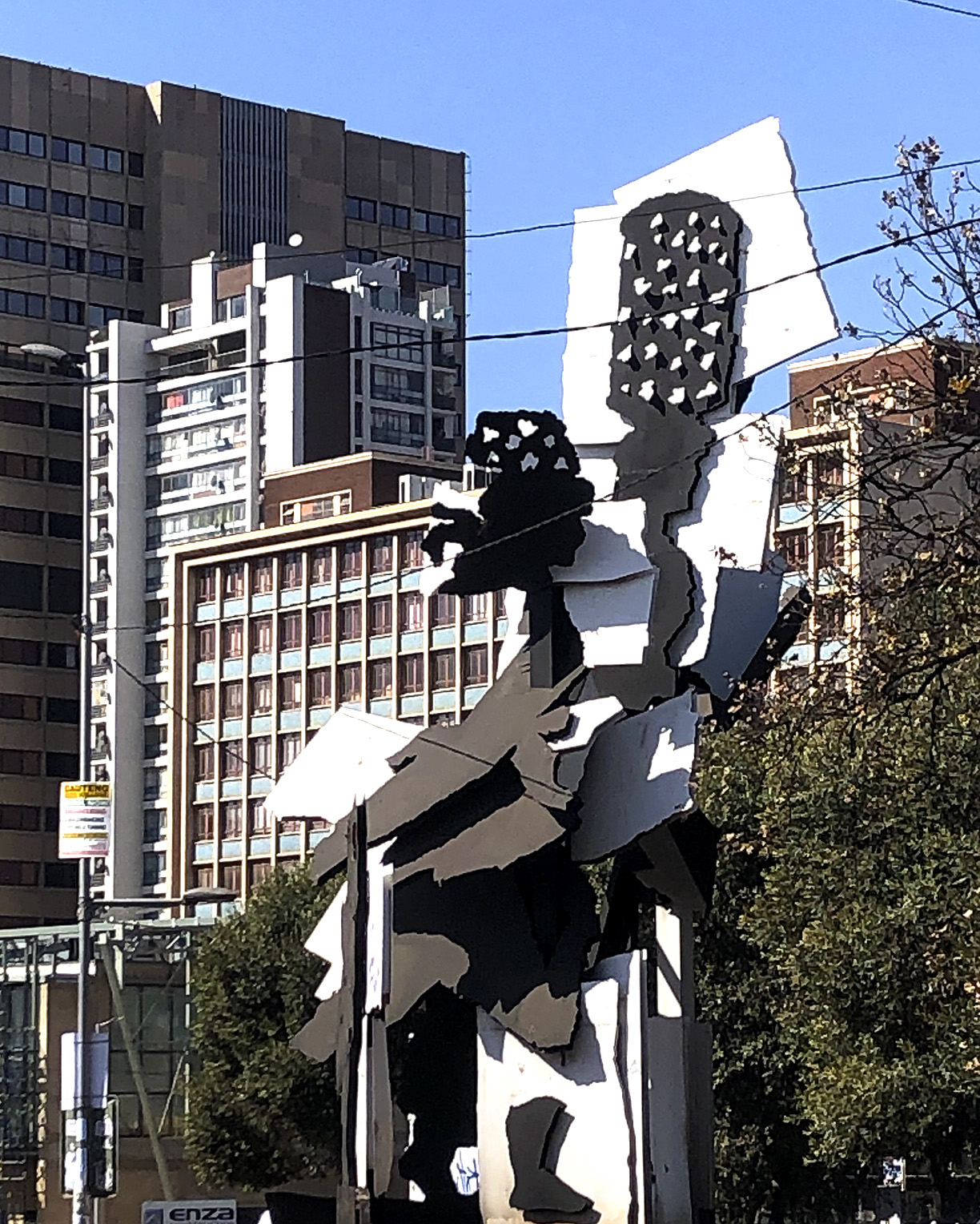
The Firewalker, a public sculpture in downtown Johannesburg by William Kentridge with Gerhard Marx. (Photo: Mark Heywood)
Giving birth to Nirvana
However, while boxing gave all four girls a purpose in life – literally something to live for – all agree that their most important rite of passage followed a conference they attended organised by the SA Women and Sport Foundation (SAWASF) in 2018. Part of the conference was a lecture on ‘inequality amongst women in sport’, a presentation that quantified the differences between what men and women earn in sport, media coverage, and so on.
It was here that, for the first time, they heard other women talk about women’s equality, sexism and abuse in sport. Sheri says they were “blown away”.
“The moment they got back to the gym, Jen confronted the boys about sexism and stereotypes, sparking a huge argument. It was this that inspired them to start Nirvana, as a community-based initiative for young girls and women in inner-city Hillbrow, Berea, Yeoville and surrounds.”
All the girls had experienced sexism at home, at school, and in the gym. Yet Sidumiso called the conference “a huge eye-opener”. She says “it addressed the things we were going through but not realising it was a problem. Until then, we thought the way we are treated was normal.” In that regard, she talks about body-shaming… the self-consciousness they felt about the clothes they wore: “After that we were ready for war.”
Langa describes Nirvana as being the start of “a mysterious journey” that helped themselves and other young women. They believe that “with greater access to education and more opportunities to develop their skill sets, there is every possibility that the desperate and overlooked girls of today will become the true leaders of tomorrow.”
One of the first things they did was to organise a conference for young women in the inner city in 2019. According to Sheri, Jen and her comrades “wanted their own conference so that other girls could experience what they did at the SAWSF conference”. So they set about organising and imagining it themselves. For example, although they debated charging girls to attend “because they wanted those who came to value it”, in the end the condition for attending was to “submit an essay about what it means to be a young woman in the inner city”.
Seventy young women did just that, and a new energy and enthusiasm was born for women’s equality among girls in the inner city.
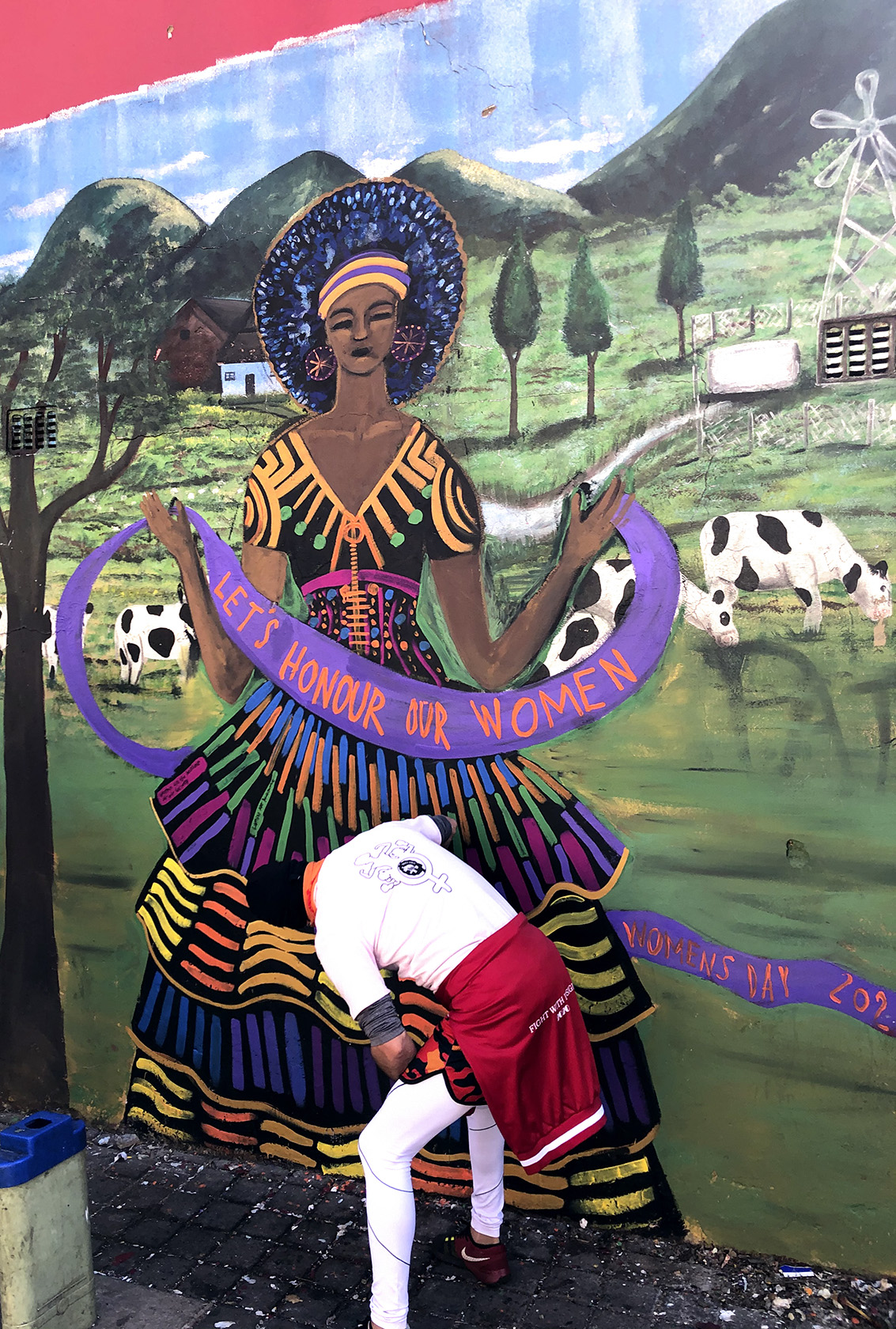
Luke Lamprecht signs a commemorative mural at the Twilight Centre in Hillbrow.
(Photo: Mark Heywood)
A blueprint for young people at risk
Meanwhile, their own lives, school careers and boxing continued. Jen competed in the SA Boxing Champs in 2018. Langa passed her matric and this year became a student at Wits studying to be a teacher. Sidumiso passed a qualification as a software engineer. Ayanda is still at school studying for matric. Their dreams for Nirvana grew and they hatched plans for a second conference of young women this year – then Covid-19 arrived.
These last six months have been difficult for young people in the inner city. The gym has been closed, schools were closed and many essential social services have shut their doors. Luke Lamprecht worries about the as yet unmeasured impact this has had on the young.
Nonetheless, Nirvana’s dreams are not dimmed.
Jen says “Covid-19 gave me room to brainstorm and plan. When we started Nirvana it was just, ‘let’s start this’. But the last few months have given me space to see the future. Now we see Nirvana as more than just about sport, but about empowering and encouraging young women in their lives.”
When we started our conversation, the girls were reluctant to talk. But once we got going, they riffed stories that touched on all the themes and challenges of contemporary South Africa and filled me with wonder, anger and hope.
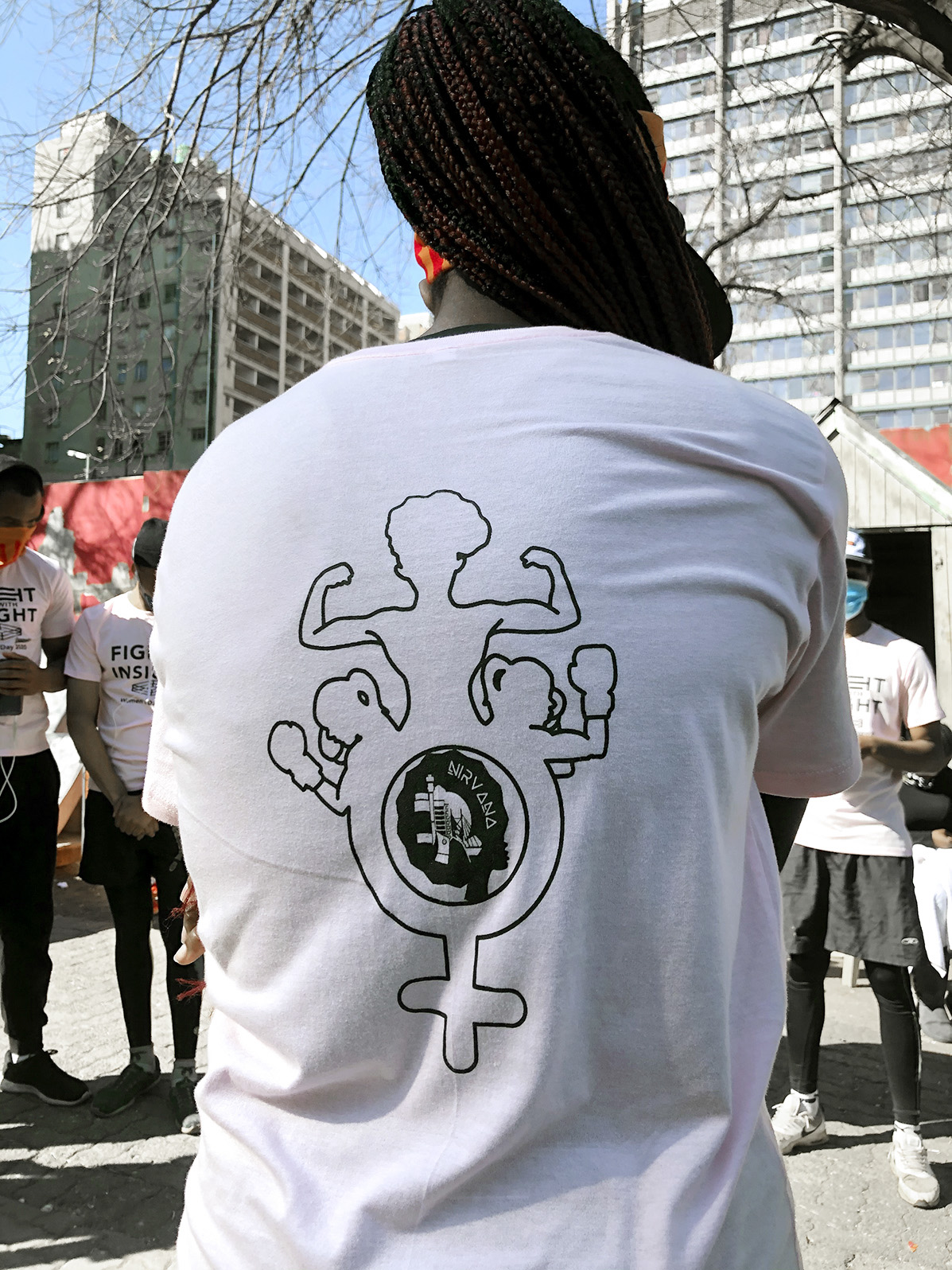
The Nirvana logo on a t-shirt. (Photo: Mark Heywood)
As we ended our discussion, my thoughts were ablaze. Face to face with Jen, Sidumiso, Langa and Ayanda, I had inhabited the vulnerabilities of young women, but also felt their power.
I could feel how dangerous life is in any inner city if you are a young woman. But as a parent, I could also internalise the fear and anxiety that grips their parents, particularly their mothers.
However, I also appreciated the importance to society of what Sheri Errington and Luke Lamprecht have done in the last 15 years. Their work provides proof of what could be achieved on a much larger scale – if only our government and businesses found the will to invest in young people, in schools and recreational facilities, and in programmes for drug rehabilitation; for young people at risk, and for those who have already come into conflict with the law. DM/MC
If you would like to support Nirvana or Fight with Insight contact: Tsakani Baloyi: [email protected] or 081 556 8883.




















 Become an Insider
Become an Insider